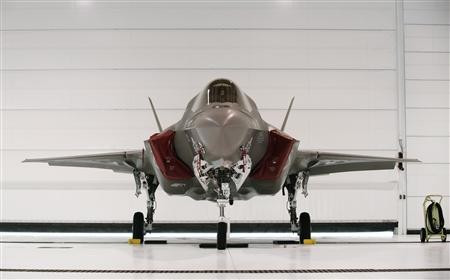New RAF Super Jet Could 'Blow Up' In Bad Weather

A new £150 million combat jet purchased by Britain's armed forces has been banned from flying in storms because it might explode in mid-air if struck by lightning.
According to a Pentagon report acquired by Time magazine, the fuel tank of the F-35 Joint Strike Fighter, named the Lightning II, is - ironically - vulnerable to lightning strikes.
Test flights for the plane are not permitted within 25 miles of an electrical storm.
The fault is the latest in a long line of setbacks in the production of the craft, billed the world's leanest, meanest and most sophisticated fighter jet, which is due to enter service for the RAF and Royal Navy in 2018.
Attempts to reduce its weight have left it more vulnerable to enemy fire than the plane it was designed to replace.
Problems with the plane's fuel system mean that it is unable to descend to low altitudes rapidly, while testers also discovered cracks in the right wing and the right engine of the F-35A variant, and cracks in parts of the F-35B design.
The plane is being designed and built by a team led by Lockheed Martin, and production is already five years behind schedule.
Britain's armed forces are buying 48 of the F-35B vertical take-off and landing models to replace its Harrier jets.
The craft has a top speed of 1,300mph and a range of 1,450 miles while the Harrier can reach 700mph and has a range of 350 miles.
The F-35's 'origami' shape has no right angles, in order to deflect radar waves and has a special fibre coating to enhance detection avoidance; the Harrier has no radar transparency or stealth capabilities.
The F-35 carries air-to-air rockets and satellite guided missiles; its pilots wear special headgear, dubbed 'Darth Vader' helmets by one test pilot, giving them 360-degree vision and displaying all the information they require.
However, the programme's spiralling cost and a series of errors have attracted critics.
It is estimated that the planes will cost the US armed forces a total of $1.5 trillion to buy, operate and maintain over the next 30 years, more than the GDP of Spain.
Winslow Wheeler at the US Centre for Defence Information described the F-35 programme as a "gigantic performance disappointment".
He added: "It's the counterintuitive problem of paying a huge amount of money thinking you're getting a Lamborghini or Ferrari: You're not, you're getting a Yugo (the cheap, mass-produced cars made in the former Yugoslavia)."
A number of countries, including Canada and Italy, have either slashed or cancelled their orders for the craft in the wake of the global financial crisis.
Britain has reduced its order from 138 under the previous government to only 48.
© Copyright IBTimes 2025. All rights reserved.






















